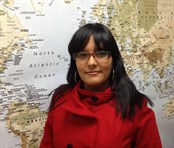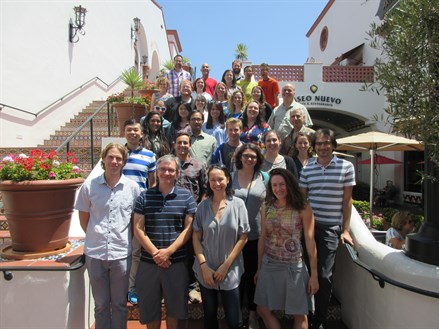 Patricia Varela, doctoral student in the Zachry Department of Civil Engineering at Texas A&M University and member of the Stochastic Geomechanics Laboratory (SGL), recently attended a three-week workshop, “Open Science for Synthesis: Gulf Research Program,” that focused on cultivating data science skills.
Patricia Varela, doctoral student in the Zachry Department of Civil Engineering at Texas A&M University and member of the Stochastic Geomechanics Laboratory (SGL), recently attended a three-week workshop, “Open Science for Synthesis: Gulf Research Program,” that focused on cultivating data science skills.
The workshop, organized by the National Center of Ecological Analysis and Synthesis (NCEAS) and funded by the National Academies of Science, Engineering and Medicine (NASEM) through the Gulf Research Program, provides training on topics like data management, integration, analysis and sharing via the use of open source community-supported tools.
NCEAS, a research center located at the University of California, Santa Barbara, focuses on promoting collaborative synthesis research over an interdisciplinary platform in the ecological sciences. Scientists across various academic domains work together to reshape and refine existing data and methods generating new informatics approaches to synthesize, analyze and share data, overall improving our environmental understanding.
“In SGL we actively work to integrate the effects of multiple threats with their corresponding impacts,” said Dr. Zenon Medina-Cetina, Varela’s doctoral advisor. “The NASEM-NCEAS workshop couldn’t be better aligned to add to our efforts of integrating all active sectors in the Gulf of Mexico, from tourism, energy and fisheries, to commerce and policy-making.”
Through the workshop lessons, Varela gained training and hands-on experience, applying the newly found skills to scientific synthesis projects based on the Gulf of Mexico’s human, environmental and energy systems. A workshop activity placed Varela on a team, collaborating on a project prompting “use of prior knowledge to inform restoration projects in estuaries of the Gulf of Mexico.” Her interdisciplinary team members came from backgrounds in forestry and estuarine ecology, epidemiology, conservation biology and engineering.
 Her team was given a case study for the evaluation of restoration activities using historical data provided by water quality monitoring stations located in Tampa Bay, Florida. Her principal contribution to the project was related to the integration of a methodology widely used for decision-making purposes known as Bayesian networks. This technique enables the incorporation of disparate sources of information, including measured data, model predictions and expert’s educated beliefs. A Bayesian decision network was implemented to estimate the potential impact of such restoration activities on “beach tourism” and “recreational fishing,” which can potentially be used to monitor and design future restoration activities, scalable to the rest of the Gulf of Mexico.
Her team was given a case study for the evaluation of restoration activities using historical data provided by water quality monitoring stations located in Tampa Bay, Florida. Her principal contribution to the project was related to the integration of a methodology widely used for decision-making purposes known as Bayesian networks. This technique enables the incorporation of disparate sources of information, including measured data, model predictions and expert’s educated beliefs. A Bayesian decision network was implemented to estimate the potential impact of such restoration activities on “beach tourism” and “recreational fishing,” which can potentially be used to monitor and design future restoration activities, scalable to the rest of the Gulf of Mexico.
“The workshop provided an invaluable opportunity to enhance collaborative efforts among peers,” said Varela. “The most important lesson learned was understanding the multiple benefits of conducting reproducible research through open science. My group members are committed to give continuation to the project, practicing the newly learned collaborative skills hopefully resulting in a scientific publication.”
Final presentation: https://fawda123.github.io/oss2017_synthesis/presentations/final_pres#/